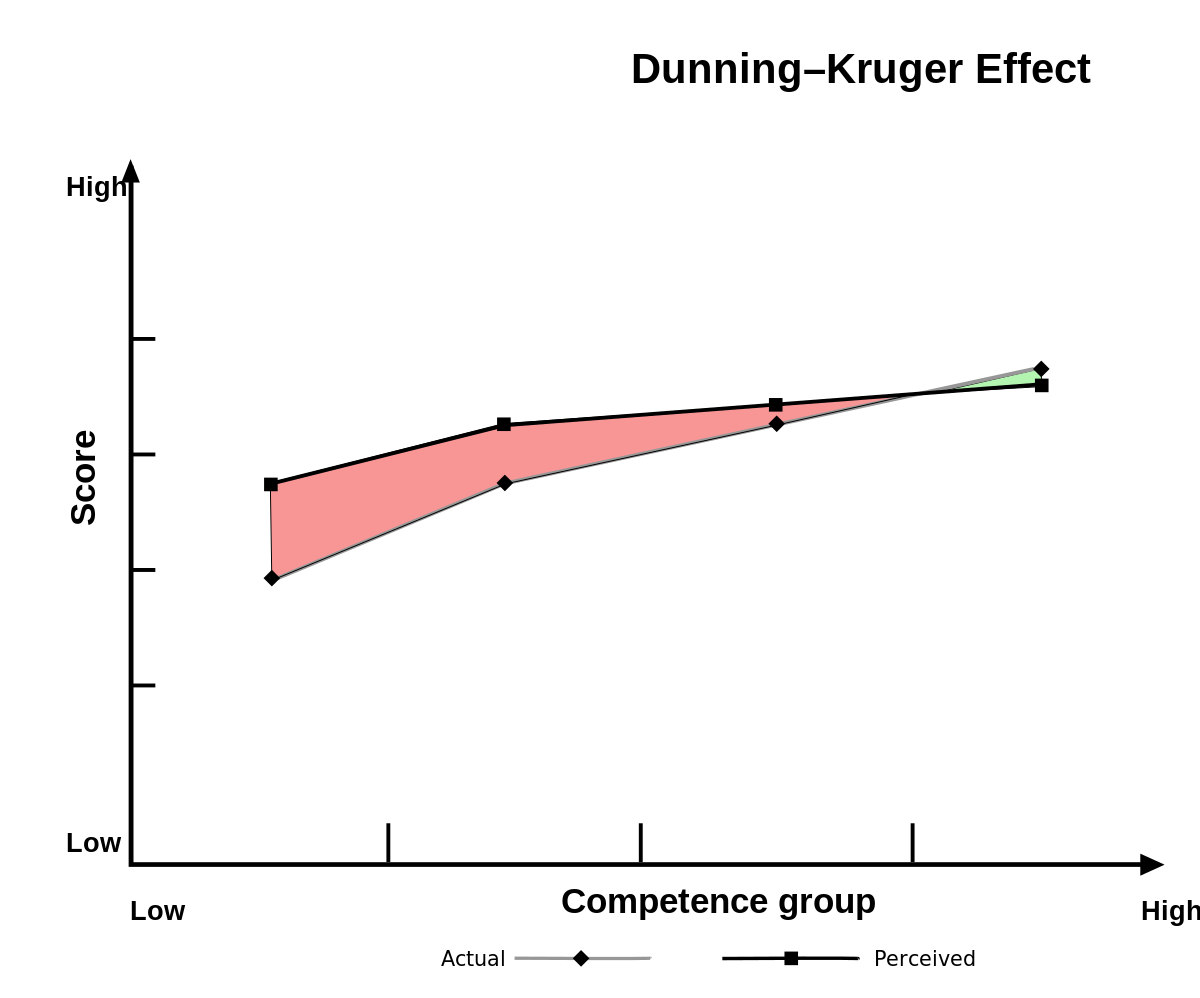The world needs more humble geniuses. We’re few and far between nowadays.
The more I’ve learned about email while writing my own email server, the more I’ve realized I knew basically nothing about email when I started. Now, I’m at least somewhat knowledgeable, but god damn it’s so fucking complicated. Even something as seemingly straightforward as email has such a deep complexity that it takes years of study to even approach being an expert.
The single most useful thing I’ve learned doing this is that you should never assume you know a lot about a topic. There are a. always more things to learn, and b. always people who know more than you.
I have long said the only truly stupid people in the world are those who think that have nothing left to learn.
I like that line. I’m stealing it. Might paraphrase to fit the situation.
I did technical trainings, and I always used to say that the only stupid question is the one you don’t ask.
This is, of course, a perfect example of D-K in action. This dude is writing his own email server, FFS, and he characterizes himself as, “at least somewhat knowledgeable”.
I’ve read a bunch of the old RFC’s for email services years ago, when you needed some of that info in order to do interesting things with sendmail. I figure that might have put me in the top 20% of programmers/admins/techies back in the day. But to actually consider writing an email server - no way. That’s a different level of “at least somewhat knowledgeable” .
The 500 mile email comes to mind.
https://www.ibiblio.org/harris/500milemail.html
Next. Level. Troubleshooting.
Oh man, that’s such a good debugging story. I really like the can’t print on Tuesday bug too:
“I’ll just validate email addresses with a bit of regex. How hard could that be?”
Right!? Fun fact, this is a perfectly valid email address:
"Pooper Scooper 💩"@[69.69.69.69]
In many collectivistic societirs, humility is a virtue.
Job before that was like this. No one will believe me.
Family run, small business, run by well-off, conservative Southern Baptists. Sound like hell?
Admitting you made a mistake was a fucking virtue. You weren’t forgiven, your mistake was ignored, except for everyone teaming up to figure a way to not let it happen again. No names, nothing said, let’s figure it out.
I’ve never worked such a culture. My next job paid double. Fucked a thing up right off the bat, no big deal, was never trusted again. I could go on about that job, but on paper, it would sound like heaven. Had so much PTO I didn’t bother tracking it, WFH, dev company.
I’d crawl on my hands and knees to get my office back with the Southern conservatives. And no one, not once, asked me about my beliefs or asked me to church.
Used to work in a place like this earlier in my career. It was a multinational, but not in the US. I transferred to another unit within the company completely different culture. It’s a place by place kind of deal.
Why did you think email was simple? Every sysadmin knows this is the most difficult system, so we outsource it whenever possible
Well, maybe physical printers are worse. Both should be outsourced. They’re both a PIA
I never thought email was simple. I thought it was straightforward. It’s not. It doesn’t matter if you follow the RFCs, you won’t have a working email server unless you listen to what the experts say.
For example, there are no RFCs about an IP address’ reputation, but that’s a real thing. When you sign up with your ISP, they’re not giving you a brand new IP address. Someone has used it before. They might have trashed its reputation, and there’s very little you can do about that. Then your emails will probably be blocked or delivered to the spam folder.
A mindset I just fell into as a much younger man for reasons I no longer remember was assuming everyone knew more than I did and did things the way they did them for a reason. And I should learn what that reason is before I go proposing changes.
That mindset has never steered me wrong. Even when I change something someone else put in place what I come up with is a better solution for taking the time to understand why the previous person did it the way that they did.
I had a soccer coach from age 7-18. Same guy, brilliant dude, Dean of law at a very large state school. He told me at 12 to never talk to the other kids at the summer camps (competition) about what i was working on. “Just go out and do it and shut your mouth about it. That’s how you impress on the field.”
It’s stuck with me since then.
So much anger I see in the world is directed at policies, laws, procedures, whatever, that make perfect sense if one understands the background.
Sucks, but we can’t all understand everything. I try, but I ain’t that smart, and certainly can’t be that experienced.
This principle is sometimes called “Chesterton’s Fence” (https://en.wiktionary.org/wiki/Chesterton’s_fence)
i assumed there was some kind of story here - it being a parable - but its kinda more like a koan.
I find that folks that just keep their mouths shut, do their jobs quietly, competently and correctly are far better to have on your team than the loudmouth know-it-all.
Bonus is that when the former does open their mouth you know you should be paying attention.
I think they call it “quiet competence”.
All too common I’ve seen those loudmouths promoted, and the quiet competent are then talked down to about something they know far more about. Then they leave.
Middle management doesn’t understand a skillset unless someone tells them directly they are skilled, it’s a culture of failure.
IME the loudmouths are mostly mouthing off about things that are totally unrelated to the problem at hand. all in some weird big to appear confident and in control.
People who think they know everything are a great annoyance to those of us who do.
— Isaac Asimov
And it’s been disproven
Could you elaborate? From what I read, Dunning and Kruger did find a real phenomenon where people with limited competence in a domain overestimate their ability, but they did not suggest these individuals thought they were smarter than experts; and one theory holds that it is a statistical truism, which still means it exists.
What happens is people have the Dunning Kruger effect on the Dunning Kruger effect itself. People call it up far too often and misuse the label
I’ve often heard it’s misunderstood and used in inappropriate situations, but it’s still a real phenomenon.
Like laypeople tossing around “OCD” when they shouldn’t. Absolutely real, but not in the same way that it’s commonly used.
They’re probably talking about this. It’s been too long since I read it so I won’t be discussing it, but I’ll share a paragraph so folks don’t have to click the link to see the gist. https://economicsfromthetopdown.com/2022/04/08/the-dunning-kruger-effect-is-autocorrelation/
The Dunning-Kruger effect also emerges from data in which it shouldn’t. For instance, if you carefully craft random data so that it does not contain a Dunning-Kruger effect, you will still find the effect. The reason turns out to be embarrassingly simple: the Dunning-Kruger effect has nothing to do with human psychology.1 It is a statistical artifact — a stunning example of autocorrelation.
Like I said after my semicolon (
;), that it’s a statistical truism doesn’t mean it doesn’t exist. https://en.wikipedia.org/wiki/Dunning–Kruger_effect#Statistical_and_better-than-average_effect One can prove that this effect will always exist for statistical reasons? That’s good to know, that not-so-competent people are more prone to overestimating.I’m not making an argument, just saying this is likely the thing they’re thinking of.
I dont understand. The additional experiment data is fairly convincing, but the random data example doesnt seem to disprove the effect in itself. With random data you are going to get a predicted score of 50 for every group, which is what is shown, but this seems to still indicate that, if this is really what people predicted, that low skill people are overestimating their ability. Obviously random data would exhibit the effect; why should it not?
Edit: i think i get it. The random data doesnt show that the low performers dont underestimate and the high performers dont overestimate on average, but this is the natural result if everyone has no idea how they performed. Thus my question above is exactly what they are trying to say; if everyone predicts randomly (everyone equally bad at predicting) the effect arises. So there might be no relashionship between performance prediction and performance
It’s been demonstrated that it’s mostly an illusion, and yet it’s hard to escape the observation that many people who haven’t studied it in detail understand the concept much less well than they think they do.
I don’t think it actually has.
I did a little digging on this, and there was one study that just threw some random numbers together and claimed it disproved it, but it doesn’t seem to be widely regarded as a silver bullet to the DKE.
Came here to say this.
It is psychologically satisfying to believe DK, but ultimately just because you like the sound of it, doesn’t make it true.
Ive always joked that the biggest case of DK is people believing they understand and can identify cases of DK despite having no psychology education. This makes for a fun paradox.
This is about as stupid as claiming you’d need to be educated in psychology to identify a Freudian slip
Identifying a psychological issue involving a disconnect between education and confidence is hardly on the same level as a freudian slip.
Identifying a psychological issue involving a person’s philosophical intention and the context of linguistical expression is hardly on the same level as the DK effect.
Today?
It has been a fad for some time.
Ironically mostly used by people who think they’re smart bcs they’ve heard of it.Knowledge doesn’t just diffuse into everyone’s minds when it hits a fad threshold. There’s still a point where one first learns about it. Shocking, I know.
You gotta be part of the hive mind man, it’s pretty cool
smart doesn’t mean anything.
It means a lot of things according to the dictionary.
You might want to look it up.
Isn’t it more that people who are given a test will tend to think that the test was easy when they score well (when they actually scored well because they’re an expert) and people will think a test is hard when they aren’t familiar with the subject (nobody could’ve answered these question!) .
So it’s more that experts and non-experts both assume their knowledge level is more average than it actually is. Not as fun as “dummies think they’re smart and smarties think they’re dumb.” We all just tend to think we’re average and most people are at a similar level of expertise to ourselves.
Its at least partially a statistical trick. People of lower competence rate themselves closer to the middle, but people with high competence also do this.
I also find it hilarious how virtually everyone acts like an expert in diagnosing dunning-krueger. Like looking at a graph for a second and then repeating an academic mystification and 5-10 word snippet repeated ad nauseum is pretty fucking ironic given the subject
No no you see, because I have heard of the Dunning-Krüger effect on no fewer than two separate occasioms, I am a master at recognizing it in people no matter where they fall on its spectrum. You just don’t understand because your overexposure to the concept has dulled your natural instincts, unlike me. /s
People with low competence fail to understand their limits, and people who are competent can identify theirs.
Nevertheless, low performers’ self-assessment is lower than that of high performers.
Removed by mod
We see what you did there
Removed by mod
Welcome to the internet
Pretty sure most lemmy users are up there. But now that I say that… could very well be wrong. Sorry everyone
most replies to my comments on here seem to think their are foolproof geniuses while espousing that there is no such thing is nuance or complexity in the world. there is only good (agree with them) or bad (disagree with them).
super big-brained thinking, that.
That graph is shaped like a gun.















